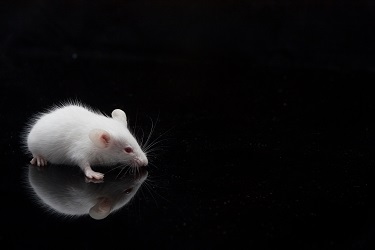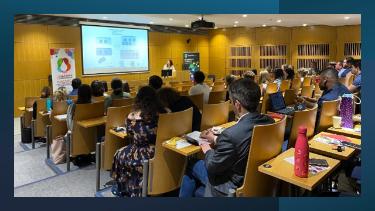2024 Research Fellowship Awards to support three exciting disease intervention research projects
Systems Biology Ireland (SBI) at University College Dublin (UCD) and The Quantitative Biosciences Institute (QBI) at the University of California, San Francisco (UCSF), and) have announced the 2024 winners of the joint Research Fellowship Awards (RFAs).
The Research Fellowship Awards aim to support collaborative high quality and ground -breaking research proposals from QBI-UCSF and UCD in the areas of network biology and drug/drug target discovery.
The winning projects for 2024 are:
- “Overcoming Resistance to HER2-Targeted Therapies in Breast Cancer,” from Oleksii Rukhlenko (SBI/UCD), Natalia Jura (QBI-UCSF) and Kliment Verba (QBI-UCSF);
- "Targeting the lysosomal proteome in Huntington's Disease," from Danielle Swaney (QBI-UCSF) and Jeffrey Glennon (UCD); and
- "Overcoming Resistance to MAPK Pathway Inhibitors in Pancreatic Ductal Adenocarcinoma," from Nevan Krogan (QBI-UCSF), Boris Kholodenko (SBI/UCD) and Nadia Arang (QBI-UCSF).
UCD and QBI-UCSF both contributed $75,000 in funds for the awards, with the total $150,000 to be split between the three projects. The three winning entries were selected by a panel of four experts following a call for submissions in October 2023.
Projects were required to have strong collaborations between researchers at QBI and UCD, with a view to ensuring future joint applications for larger scale external funding from bodies such as NIH/NCI – CRUK Grand Challenges, EU grants, SFI-US-Ireland R&D Programme, and others.
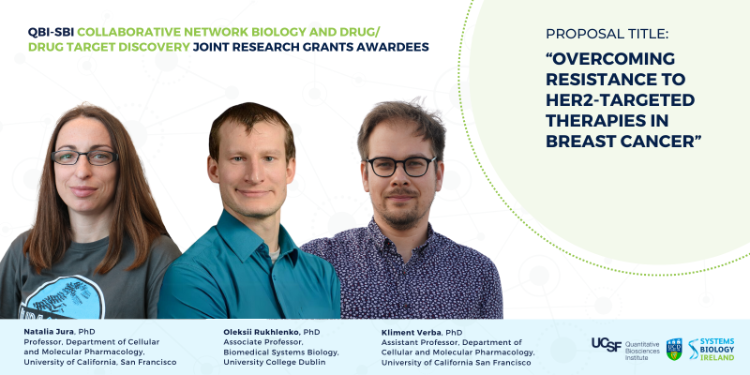
The Rukhlenko/Jura/Verba project winners were delighted to share their plans:
“The main aim of the current project is to obtain systemic understanding of resistance mechanisms in HER2-positive cancers and ways to overcoming resistance,” said Oleksii Rukhlenko. “This will be done by combining expertise in structural biology from Verba and Jura groups, and expertise in modelling and data integration from Rukhlenko group.”
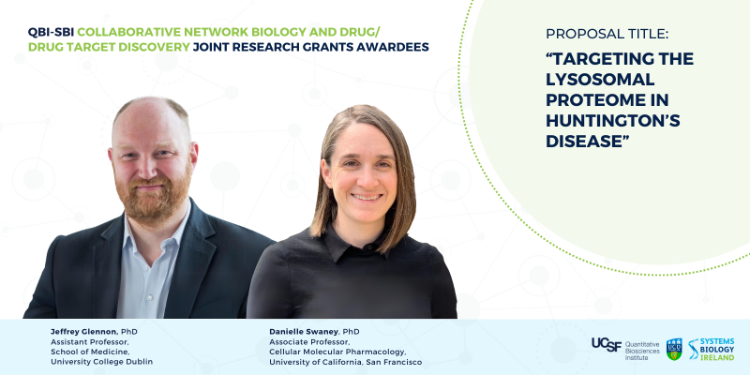
The Swaney/Glennon partnership gave the following comment:
“We are thrilled to receive this funding. Huntington’s Disease is a devastating disease with marked cognitive and motor changes. This award will enable the Swaney (QBI-UCSF) and Glennon (UCD) groups to perform fundamental research probing proteomic-metabolic interactions in models of Huntington’s Disease. It is hoped this will lead to new intervention strategies.”
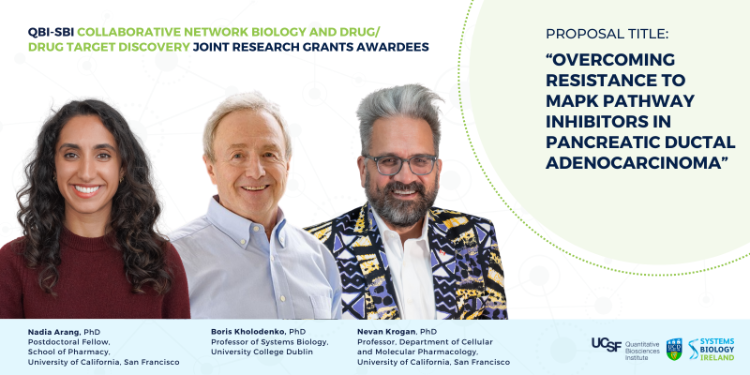
The awarded project from the Kholodenko/Krogan labs aims to address Pancreatic ductal adenocarcinoma (PDAC), an aggressive cancer with a serious mortality rate. The group said:
“To comprehend and overcome PDAC resistance, we plan to leverage a significant breakthrough from the SBI and QBI labs. SBI has pioneered a new powerful approach termed cell State Transition Assessment and Regulation (cSTAR), whereas QBI has pioneered advanced techniques in phosphoproteomics, interaction proteomics, and proteomics-to-genetics technologies. The received funding will help a joint SBI and QBI effort which will unravel resistance mechanisms, identify new therapeutic targets, and ascertain optimal drug combinations to overcome or significantly delay resistance in PDAC.”
“The joint RFA with QBI is both unique and exciting,” said Systems Biology Ireland (UCD) Director, Walter Kolch. “It was our hope that this call would attract submissions from researchers looking to fund original, bold studies that might otherwise be unlikely to gain support from more conventional grants.”
Andrej Sali, a member of the QBI Executive Committee and Professor in the Departments of Bioengineering and Therapeutic Sciences, as well as Pharmaceutical Chemistry at UCSF, said:
"Fostering collaborative research lies at the heart of QBI's mission, driving us to work on bringing together diverse research communities. These joint research grants with University College Dublin serve as a bridge, connecting scientists to maximize the synergy between their research programs. Together we are pushing the boundaries of what's possible."
